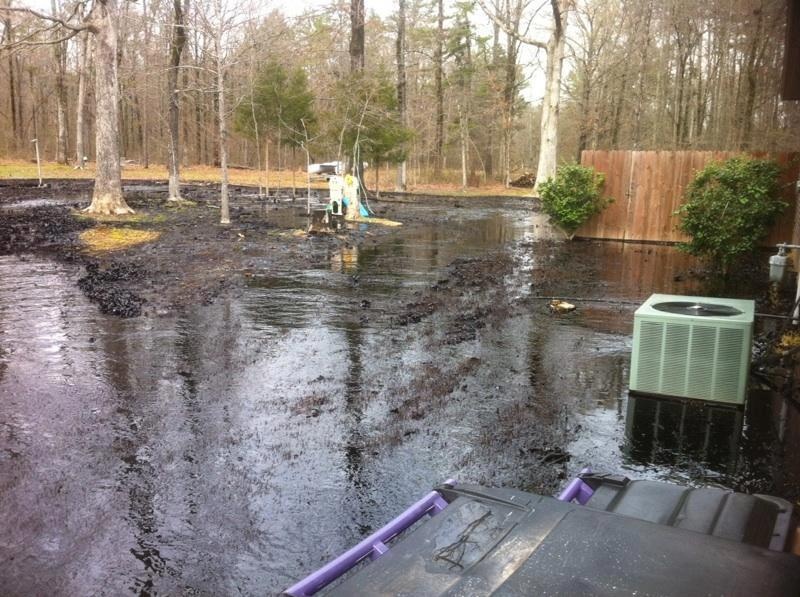Exxon Mobil hit with $1.7M pipeline safety fine days before Arkansas oil spill

Last Friday afternoon, residents of the central Arkansas community of Mayflower looked on in horror as thousands of barrels of crude oil bubbled up in their yards and poured down their streets after a nearby Exxon Mobil pipeline ruptured.
Twenty-two families have been displaced by the March 29 spill, the fumes from which can present a health risk. Some of them said they didn't know the pipeline was there until the accident happened.
Over the weekend, vacuum trucks sucked up spilled oil amid heavy rains as efforts were made to keep the mess out of Lake Conway, a popular state-owned fishing spot just east of the disaster site. So far, cleanup crews have recovered some 12,000 barrels -- about 500,000 gallons -- of spilled oil and water, according to Exxon Mobil.
The company has shut down its 848-mile Pegasus pipeline, which carries Canadian crude from Illinois to the Texas Gulf Coast, and it plans to excavate to figure out what caused the break. Pegagus is the primary mover of Canadian crude to Gulf Coast refineries.
Exxon Mobil has apologized for the spill and says it will pay cleanup costs and damages.
"This should not happen so it is our responsibility to make it right and that's what we're doing," company spokesperson Allen Jeffers told KATV News.
This isn't Exxon Mobil's first brush with pipeline safety issues.
Just four days before the Arkansas spill, the Irving, Texas-based oil giant was hit with $1.7 million in proposed fines from the U.S. Department of Transportation's Pipeline and Hazardous Materials Safety Administration (PHMSA) for a July 2011 pipeline failure that spilled about 42,000 gallons of oil into the Yellowstone River near Laurel, Mont. That spill involved the Silvertip Pipeline carrying crude oil an Exxon Mobil refinery in Billings, Mont.
According to PHMSA, Exxon Mobil "failed to properly address known seasonal flooding risks to the safety of its pipeline system."
The Yellowstone spill came a year after the Department of Transportation notified Exxon Mobil about seven potential safety problems along the Silvertip, including issues with emergency response and pipeline corrosion training.
In February 2010, the company was also notified of "probable violations" related to the Silvertip, including inadequate markers in a housing development and vegetation in a housing area that covered a portion of line and prevented aerial inspections.
Last year, President Obama signed into law the Pipeline Safety, Regulatory Certainty, and Job Creation Act of 2011, which doubled the maximum civil penalty PHMSA can issue for single pipeline safety violations from $100,000 to $200,000, and from $1 million to $2 million for a series of related violations. The law also authorized PHMSA to hire more federal pipeline inspectors.
The U.S. has some 2.3 million miles of oil and gas pipelines, and spills and other accidents are disturbingly common occurrences. Since the turn of the century, Exxon Mobil has been involved in several serious pipeline failures, including a rupture in Texas involving an inadequately marked line that left one man dead, and a Pennsylvania pipeline fire that forced more than 40 families from their homes.
Many of the incidents involve serious water contamination. For example, a July 2010 rupture of an Enbridge Energy Partners pipeline in Michigan sent over 1 million gallons of Canadian crude into a creek that feeds the Kalamazoo River.
The Arkansas spill comes amid a contentious political battle over TransCanada's Keystone XL pipeline planned to carry Canadian tar sands oil to refineries on the Texas Gulf Coast. (The Arkansas spill involved Wabasca Heavy crude, a blend of oil produced in the Athabasca region of Alberta, including tar sands oil.) The Keystone will cross the Oglalla Aquifer, which stretches across eight states including Texas and supplies drinking water to millions of people.
The Keystone XL is awaiting final approval from the State Department, which needs to approve the structure since it crosses an international border. The Obama administration has said it wants to make building the Keystone XL pipeline a "priority," but many environmentalists oppose the plan. One concern is that tar sands oil is particularly corrosive, increasing the likelihood of pipeline problems.
They point to the Arkansas disaster as a sign of things to come.
"We'd be wise to think about this as one more sad warning, like the spills in Kalamazoo and the Yellowstone River," said Bill McKibben of 350.org, which is fighting the Keystone because of its impact on climate. "What the people of Arkansas are enduring today is a reminder of why approving KXL, a pipeline 10 times as large and running across the Oglalla Aquifer, defines a bad idea."
(Photo of oil-covered backyard in Mayflower, Ark. comes via Facebook from AJ Zolten, who said the picture was taken "by a friend's daughter who lives next door to this house." He added, "Share this widely!")
Tags
Sue Sturgis
Sue is the former editorial director of Facing South and the Institute for Southern Studies.
